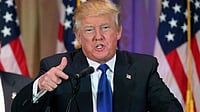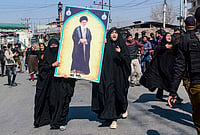China is witnessing an exodus of workers from Apple's largest factory to their hometowns, according to reports.
A large number of workers are jumping fences at Foxconn's assembly site for Apple iPhone in Zhengzhou city to escape China's 'Zero Covid' rules.
Foxconn is a Taiwanese company which manufactures iPhones for Apple. The Zhengzhou factory is the largest in the world with around 2,00,000 workers. Workers at the factory premises are reportedly being held in quarantine after some of them tested positive. As a result, desperate workers are jumping fences and walking hundreds of kilometres to their hometowns.
Footage of such escapes and long walks home have surfaced on the internet, with several reports claiming that they are forced to walk in the absence of any transport services.
'Zero Covid' policies of China, under which entire housing units and even towns are locked down after just a few cases, has ignited protests in China in recent months. Just days before a major Chinese Communist Party meeting this month, posters appeared in China's capital Beijing which called President Xi Jinping a "tyrant" and "dictator" over Zero Covid policies.
What we know of escaping Apple workers?
The BBC reported that there has been a Covid-19 outbreak at Foxconn's factory in Zhengzhou city.
Following the outbreak, workers have broken out of the facility and have embarked on hundreds of miles of walks back home, as per BBC.
It's not yet known how many Covid-19 cases have been reported at the factory but reports said Zhengzhou, Henan province's capital, reported 167 locally transmitted infections in the week ending October 29, up from 97 the week before, which has caused parts of the city of around 10 million to be locked down under Zero Covid policy.
Footage of workers walking to hometowns has surfaced on the internet.
A 22-year-old worker, surnamed Xia, told the Financial Times there was "total chaos in the dormitories", adding: "We jumped a plastic fence and a metal fence to get out of the campus."
Fears of Covid spread with returning workers
As workers walk to their hometowns from a factory where infections have been reported, there are fears they may carry the disease with them.
This has forced local authorities in Central China to draw up plans to deal with incoming workers, according to The Guardian, which adds that plans are being chalked out to isolate and register these workers.
Reports also suggest that workers are not allowed to avail transport services.
"Abandoned by both employer and local government after a Covid-19 outbreak in Foxconn factory site, workers are not allowed to take any public transport but walk home," reported The Great Translation Movement.
However, authorities said that transport is being arranged for these workers.
"Returning workers were to travel 'point to point' in arranged vehicles and be quarantined on arrival, authorities said in separate letters posted on social media and addressed to Zhengzhou Foxconn workers," reported The Guardian.
What is Zero Covid policy?
China's 'Zero Covid' policy is in contrast with the 'living with virus' approach the rest of the world has taken.
Under 'Zero Covid' approach, the Chinese authorities respond to infections with blanket lockdowns and tough quarantines with the idea of limit public movement in an area to eradicate the infections and trasnmission.
In the rest of the world, targeted measures such as quarantine of the infectioned, isolation of suspected contacts, and tracing of close contacts is carried out, and cities and towns are no longer locked downs. Even when there are bigger outbreaks, particular apartment blocks or neighbourhoods get focussed measures rather than the broader city or town.
Through the year, China has locked several millions of people for weeks and months in cities like Shanghai and Beijing under the 'Zero Covid' policy.
This has also affected China's economic growth. China's financial hub Shanghai and capital Beijing were locked down for months earlier this year. " In March, an estimated 345 million people across 46 cities were in full or partial lockdowns, a population accounting for 40 per cent of GDP," said the Center for Strategic and International Studies (CSIS) in a report.
Economists warn that China needs to boost growth that sank to 2.5 per cent over a year earlier in the first half of 2022, less than half the official annual target of 5.5 per cent, after Shanghai and other industrial centers shut down starting in late March to fight virus outbreaks.
“China's economy is at risk of stalling" due to the “impact of epidemic prevention and control policies", said think tank Anbound Research Center.
The CSIS report cited above noted that mass testing, part of the Zero Covid policy, also comes at a huge financial cost — as much as 1.5 of China's GDP.
"While the Chinese leadership believes that massively expanded mass testing will identify infections early and trigger measures to contain the outbreak without causing harmful disruption to the economy, it is still too early to know whether that approach will succeed. One thing is known: testing at this scale costs tens of billions of dollars, which may amount to 1.5 per cent or higher of China’s GDP," reported CSIS.
Anger against Zero Covid policy
In an extremely rare public display of anger against Xi Jinping, banners appeared in Beijing earlier this month which called Xi a "tyrant" and "traitor" over 'Zero Covid' policies.
The banners called Xi a dictator and a tyrant, as per translations available on the internet, and called for the easing of restrictions under the 'Zero Covid' policy and said people should have rights and should not be treated like slaves.
Nobtably, the banners appeared days before the Communist Party of China (CPC) convened its 20th National Congress in which an unprecedented third presidential term was approved for Xi.
A translation by CNN journalist Selina Wang of some of the slogans read as "Go on strike. Remove dictator and national traitor Xi Jinping" and "Say no to covid test, yes to food. No to lockdown, yes to freedom".
Journalist Bill Birtles in a tweet explained why the protest was "extraordinary": "Extraordinary given pre-Congress security plus surveillance...Extraordinary given the politics and security just out from the Congress...Such a small protest elsewhere wouldn't be worth so much attention but in Beijing. If anything the other banner is all the more daring in pre-Congress Beijing, calling Xi Jinping a dictator and calling for strikes."






















